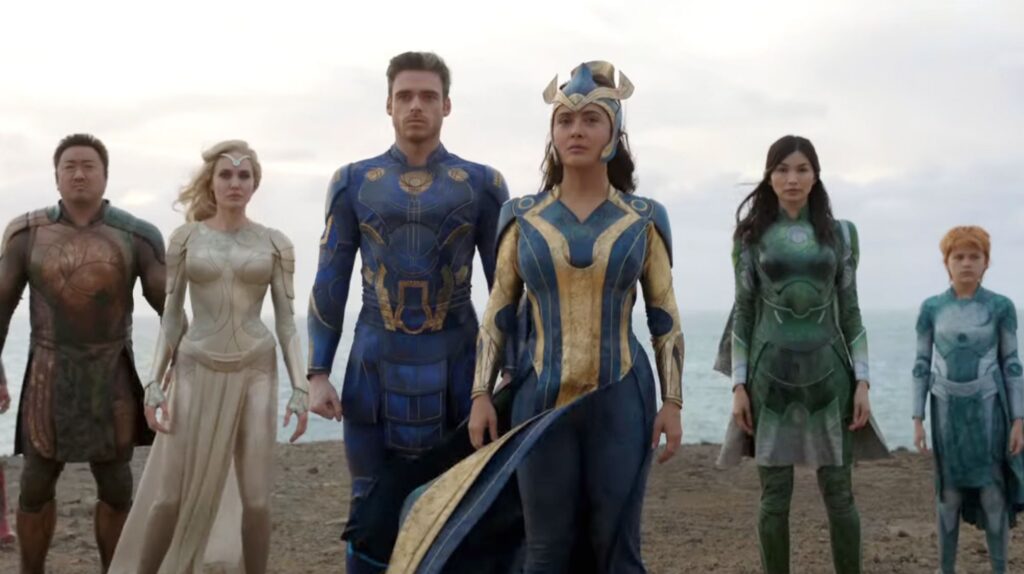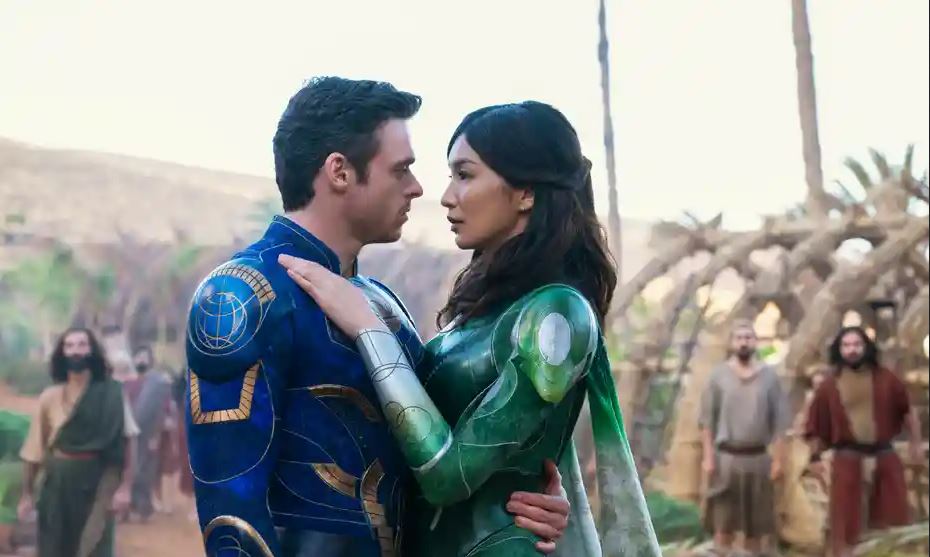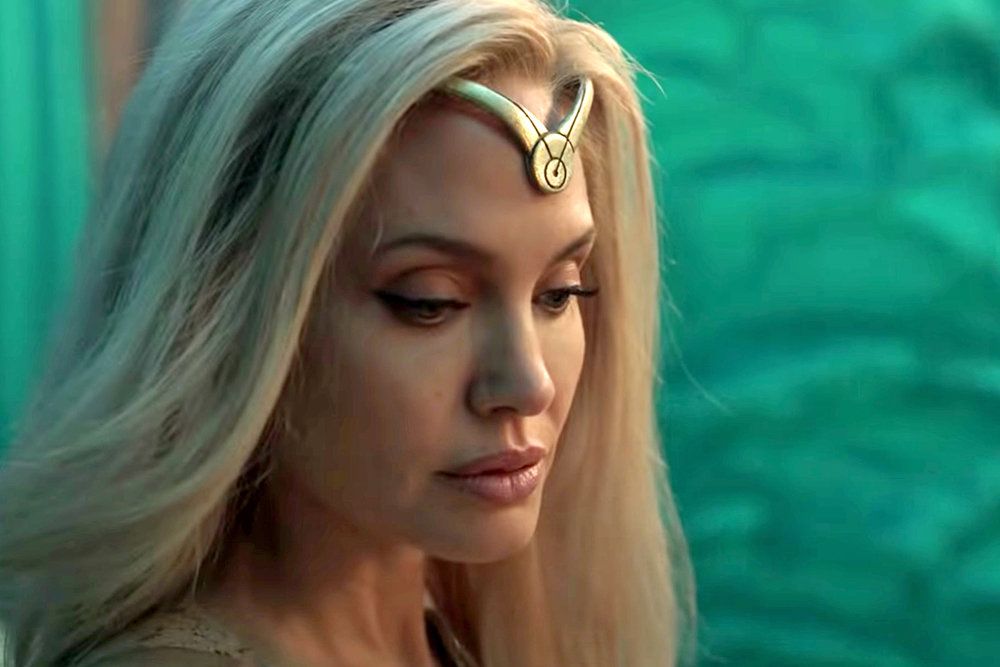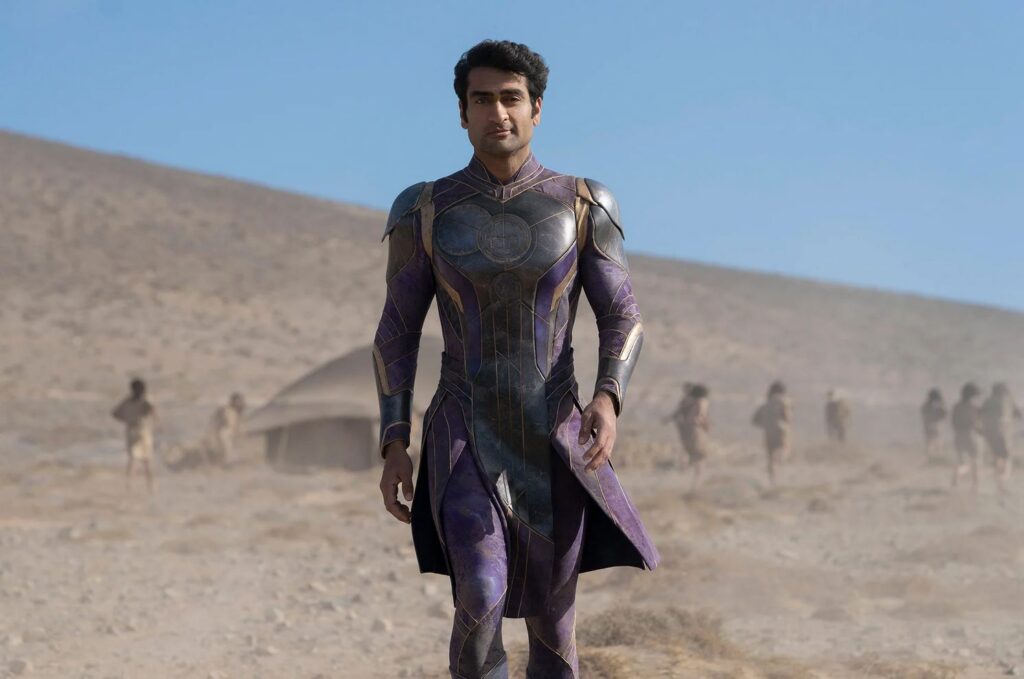
Auteur theory meets its match in Eternals, the strange, occasionally beguiling, ultimately tedious new entry in the Marvel Cinematic Universe. Critics tend to consider movies as belonging to their director, but Disney’s primary interest in property has always been intellectual rather than artistic. This doesn’t mean that the 21st century’s dominant franchise is devoid of personality—just that its cagiest filmmakers (James Gunn and Ryan Coogler among them) operate simultaneously as smugglers and stewards, sneaking in eccentric touches while hewing to commercial imperatives. Hell, the Russo brothers turned the latter Avengers pictures into billion-dollar hits less through innovation than carefully calibrated deference; they served their fans, pleased their bosses, and didn’t make anyone unhappy, which becomes easier when you take so few risks.
Into this minefield of consumer expectation and corporate ownership now steps Chloé Zhao, fresh off of winning two Oscars for Nomadland, and laboring to bring some art-house punch to the multiplex’s most anodyne commodity. It’s tempting to accuse the Marvel machine of squeezing the color out of Zhao’s filmmaking, and to brand her as yet another victim sacrificed on the altar of sequel churn. But Eternals, which Zhao also wrote with Patrick Burleigh (repurposing an original script by Ryan and Kaz Firpo), is too odd and intriguing to be disregarded as the product of studio interference. No, its failings are more pedestrian and predictable; its characters are unmemorable, its plot is nonsensical, and its action is risible.
This doesn’t make the movie meritless. One of its challenges—the need to introduce a host of new inhuman characters and integrate them into the rigorously patrolled boundaries of the MCU—is also something of a blessing; despite the requisite mid- and post-credits stingers and a passing reference to “Captain Rogers”, Eternals is largely untethered from Marvel’s existing episodes. This affords Zhao a modest measure of freedom, allowing her to tell a sprawling story—the film opens in 5000 BCE and periodically travels back in time to places of historical importance, like Babylon—and to imbue her gang of super-beings with their own quirks and foibles. There are quite a few of them, though the most significant to the narrative are probably Sersi (Gemma Chan), a pensive intellectual who can convert inanimate objects into different forms of matter; Ikaris (Richard Madden), a garden-variety superman who can emit beams of energy from his eyes and fly as close to the sun as he wants; Sprite (Lia McHugh), a pixie-like woman who’s trapped in the body of a 12-year-old, and who can create illusions on par with those of a mid-budget special effects team; and Thena (Angelina Jolie), a warrior goddess who’s good with a blade but struggles with a troubling form of alien dementia.

You may have noticed, even without Sprite’s aside that the story of Ikaris’ solar-induced demise is actually just phony bedtime lore, that these names are slight deviations from figures in Greek mythology. Eternals hardly functions as a classics textbook (its heroes hail from the planet of Olympia, get it?), but it is nevertheless glutted with its own mythos, which is both exhaustive and exhausting. There are an inordinate number of scenes set in some sort of interstellar cosmos where one of our heroes—usually Ajak, the “prime” eternal who’s the group’s appointed leader, and who’s played with solemn dignity by Salma Hayek—converses with Arishem (voiced by David Kaye), a colossal titan who looks like a gigantic Lite-Brite Iron Man with all of the colors tweaked to burnt orange. Arishem, who is apparently a race of super super-beings called celestials, issues pronouncements about sinister reptilian creatures called deviants, who come across as surly relatives of the giant lizard whom Ewan McGregor rode in Revenge of the Sith. There is talk of apex predators, and the precarious path of human evolution, and an imminent cataclysmic event called The Emergence.
Most of this plotty chatter—a mishmash of comic-book esoterica and pseudo-scientific prattle—is miscalculated. The Marvel movies, despite nominally being about caped crusaders, have always worked best when they operate on a small scale, thriving on playful dialogue and personal rivalry. Zhao’s decision to zoom out and tell a weighty tale of galactic proportions necessarily blunts some of the film’s more intimate pleasures. (Speaking of which, there’s an actual (simulated) sex scene, plus an openly gay character who isn’t restricted to the margins—progress for horndogs and egalitarians alike!)

At the same time, Eternals is genuinely invested in examining the metaphysical complexities inherent in its characters’ divinity. “The end of one era is the beginning of another,” someone intones, and while that’s arguably mumbo-jumbo, it also hints at the movie’s preoccupations with the passage of time and the paradox of immortality. Does everlasting life drain existence of its meaning? Is it possible for gods and humans to truly connect when their relationships—such as the one Sersi is tentatively pursuing with a sweet-natured (and uncommonly attractive) history professor played by Kit Harington—automatically come with an asymmetrical expiration date? Do deities owe a duty of loyalty to their creations? These questions are hardly unprecedented in literature, but Zhao lends them a certain gravity and sincerity, even possessing the gall to set one somber flashback amid the fallout of the Hiroshima bombing.
That’s one of a handful of vast outdoor locations where Zhao supplies some natural beauty (the Amazon is another), a welcome respite from the MCU’s typically stolid architecture. Alas, she fails to find a cure for the franchise’s more ruinous epidemic: weightless, desultory action scenes. Zhao isn’t the first director to be rendered helpless when it comes to translating kitschy on-the-page powers—lightning blasts, force fields, telepathically wielded hurricanes—into visceral on-screen battles, but Eternals nonetheless features some of the weakest and flimsiest sequences of chaos and carnage of the blockbuster era. Those aforementioned deviants are poor antagonists, lumbering across the scenery without any tangible force, while the heroes are even worse, channeling vague abilities with no sense of relative strength. Aside from a few brief moments of cleverness involving Sersi’s talent for transfiguration, the movie’s many scenes of cosmic warfare are uniformly catastrophic—leaden, incoherent, numbing.

But remember, the Marvel pictures subsist more on camaraderie than combat. So it’s especially dispiriting that Eternals’ character dynamics are so dull. The screenplay attempts to leaven the sober philosophizing with morsels of levity—much of the designated comic relief comes courtesy of Kingo (Kumail Nanjiani), a Bollywood icon whose valet (Harish Patel) steals his share of laughs—but most of the banter is phony and strained. Stabs toward pathos are even more fraudulent, in particular a hazily drawn love triangle that dissolves into a shapeless mass of pain and betrayal. Bloat is an issue as well, not so much the 157-minute running time but the sheer number of characters; there are 10 titular warriors, and while they’re all played by skilled actors—the cast is rounded out by Brian Tyree Henry, Lauren Ridloff, Don Lee, and a poorly served Barry Keoghan—Zhao’s obligation to grant each of them sufficient screen time produces a flattening effect, preventing anyone from emerging with a fully developed persona.
The ultimate sensation of watching Eternals is peculiar, and not entirely unpleasant. Here is a superhero movie whose broad structure resists conforming to the basic MCU blueprint, even as it aims (and fails) to deliver the same laughs and thrills which have become franchise prerogatives. Its successes are new, while its failures are familiar. Perhaps that’s what makes the mandatory sequel teases of the denouement feel even limper than usual—not so much a betrayal of the film’s provocative thematic inquiries as confirmation that they never really mattered in the first place. By the same token, if you deem the finale of Eternals to be anticlimactic, you’re missing the point. After all, the end of one movie is just the beginning of another.
Grade: C+
Jeremy Beck is the editor-in-chief of MovieManifesto. He watches more movies and television than he probably should.
